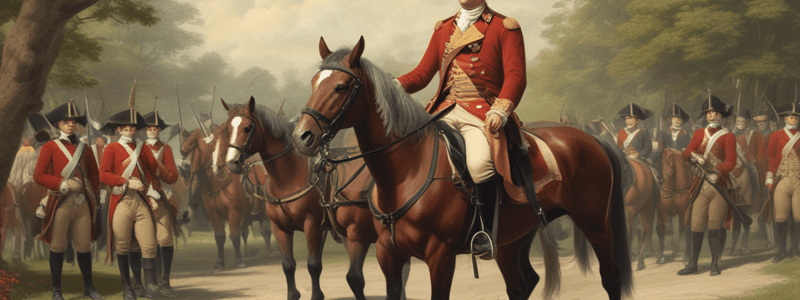Podcast
Questions and Answers
Which writer was important in persuading many American colonists to seek independence from Britain?
Which writer was important in persuading many American colonists to seek independence from Britain?
Tom Paine
Where did Lord Cornwallis surrender in 1781, marking the end of the war?
Where did Lord Cornwallis surrender in 1781, marking the end of the war?
Yorktown
In what year was the Peace Treaty signed, formally ending the war and recognizing American independence?
In what year was the Peace Treaty signed, formally ending the war and recognizing American independence?
1783
What was the main reason behind the British government's decision to impose new taxes on the American colonists?
What was the main reason behind the British government's decision to impose new taxes on the American colonists?
What territory did Britain retain control of after the American Revolution?
What territory did Britain retain control of after the American Revolution?
Why was the Stamp Act introduced by the British in 1765 different, and who particularly was upset?
Why was the Stamp Act introduced by the British in 1765 different, and who particularly was upset?
What motivated thousands of loyal colonists to migrate to Canada or Europe after the war?
What motivated thousands of loyal colonists to migrate to Canada or Europe after the war?
How did the British respond to resistance to the Stamp Act in 1766?
How did the British respond to resistance to the Stamp Act in 1766?
What was the consequence for the British Empire of the disintegration of Britain's American empire?
What was the consequence for the British Empire of the disintegration of Britain's American empire?
What was the consequence of the Townshend Acts introduced by the British in 1767?
What was the consequence of the Townshend Acts introduced by the British in 1767?
What was the primary purpose of Britain's colonization of Australia?
What was the primary purpose of Britain's colonization of Australia?
Describe the Boston Tea Party?
Describe the Boston Tea Party?
What was the purpose of the Coercive Acts passed by the British in 1774?
What was the purpose of the Coercive Acts passed by the British in 1774?
What was the initial aim of the colonists when they started fighting against Britain?
What was the initial aim of the colonists when they started fighting against Britain?
How did the American Revolution influence British politics and governance?
How did the American Revolution influence British politics and governance?
What were the economic consequences of the American Revolution on Britain?
What were the economic consequences of the American Revolution on Britain?
How did the American Revolution inspire movements for political change in Ireland?
How did the American Revolution inspire movements for political change in Ireland?
What role did reformers like Charles James Fox play in the aftermath of the American Revolution?
What role did reformers like Charles James Fox play in the aftermath of the American Revolution?
What was the significant impact of the Treaty of Paris (1783) on Britain's colonial policy?
What was the significant impact of the Treaty of Paris (1783) on Britain's colonial policy?
Which political faction in Britain received a boost from the war?
Which political faction in Britain received a boost from the war?
What were the objectives of Charles James Fox's attempted parliamentary reforms following the revolution?
What were the objectives of Charles James Fox's attempted parliamentary reforms following the revolution?
What was the broader impact of the American Revolution on British politics and society?
What was the broader impact of the American Revolution on British politics and society?
Flashcards are hidden until you start studying
Study Notes
British Colonies and the American Revolution
- The British government imposed taxes on American colonists to pay for British armed forces in America, leading to growing tensions between the two.
- The Stamp Act (1765) put a tax on documents and items, sparking riots in the colonies, which led to its cancellation in 1766.
- The Townshend Acts (1767) introduced new taxes, triggering protests and eventually the "Boston Massacre" in 1770.
- The Boston Tea Party (1773) saw colonists dressed as Native Americans dumping taxed tea into the sea, prompting the Coercive Acts (1774) that punished Boston and restricted their democratic rights.
American War of Independence
- Relations between Britain and the colonies deteriorated, leading to the outbreak of war in 1775.
- The initial goal of the colonists was to have more control over their affairs, but they eventually sought independence after the publication of Thomas Paine's book "Common Sense" in 1776.
- The Declaration of Independence was signed on July 4, 1776, formally severing ties with Britain.
- The war ended with Lord Cornwallis' surrender at Yorktown in 1781, and the Peace Treaty was signed in 1783.
Aftermath of Independence
- The 13 American colonies became the independent United States of America.
- Thousands of loyal colonists migrated to Canada or Europe, seeking to build a new nation with "English liberties" under British rule.
- Britain turned its attention to colonizing other territories, notably Australia, which was used as a penal colony for British convicts.
The American Revolution's Impact on Britain
- The Treaty of Paris (1783) recognized the independence of the United States, marking a significant shift in British colonial policy and influencing future imperial strategies.
- The defeat of the British in the American Revolutionary War led to the rise of Whig radicals, who criticized the government's handling of the war and advocated for political reforms.
Charles James Fox and the Whig Radicals
- Charles James Fox was a leading Whig radical who supported the American colonists and argued for their grievances to be addressed peacefully.
- Fox famously condemned the war as early as 1774 and continued his opposition throughout the conflict.
- He advocated for parliamentary reform, including the reduction of the monarchy's influence and the expansion of suffrage.
Parliamentary Reform and Civil Liberties
- The Whigs pushed for parliamentary reform, including the reduction of the monarchy's influence and the expansion of suffrage.
- Fox championed civil liberties, advocating for freedom of speech and the press, and supported John Wilkes in his campaign for press freedom.
- He led the campaign to abolish the slave trade, contributing to the eventual passage of the Abolition Act in 1807.
Political Reforms and Debates
- The defeat prompted debates about political reform within Britain, with reformers like Charles James Fox advocating for changes, including parliamentary reform and the expansion of suffrage.
- The Gordon Riots of 1780 highlighted the need for addressing public discontent and reforming the political system.
Economic Impact
- The war significantly strained Britain's finances, increasing the national debt.
- The financial pressure led to tax reforms and influenced economic policies, including trade policies and relations with other nations.
Influence on British Politics
- The American Revolution had a profound impact on British politics, contributing to the decline of the Tory party and the rise of the Whigs.
- Key figures such as William Pitt the Younger emerged, advocating for a stronger, more centralized government to manage the empire more effectively.
Influence on Irish Affairs
- The American Revolution inspired movements for political change in Ireland, including the Volunteer Movement and the subsequent Irish Rebellion of 1798.
- The American quest for independence highlighted the interconnectedness of revolutionary ideals and influenced Irish politics.
Studying That Suits You
Use AI to generate personalized quizzes and flashcards to suit your learning preferences.




